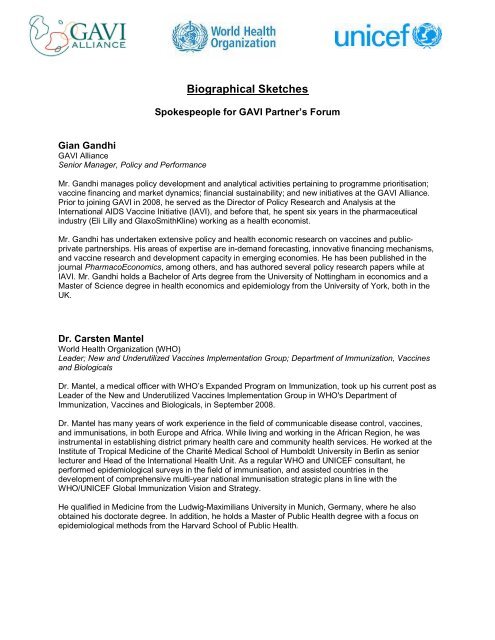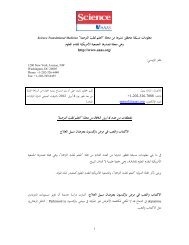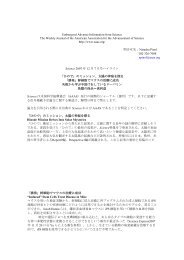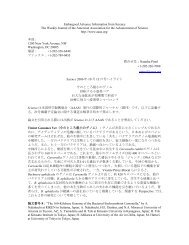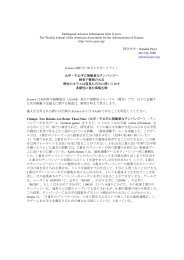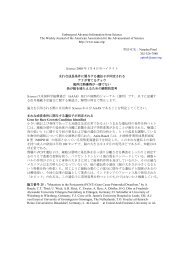Biographical Sketches - EurekAlert!
Biographical Sketches - EurekAlert!
Biographical Sketches - EurekAlert!
You also want an ePaper? Increase the reach of your titles
YUMPU automatically turns print PDFs into web optimized ePapers that Google loves.
<strong>Biographical</strong> <strong>Sketches</strong><br />
Spokespeople for GAVI Partner’s Forum<br />
Gian Gandhi<br />
GAVI Alliance<br />
Senior Manager, Policy and Performance<br />
Mr. Gandhi manages policy development and analytical activities pertaining to programme prioritisation;<br />
vaccine financing and market dynamics; financial sustainability; and new initiatives at the GAVI Alliance.<br />
Prior to joining GAVI in 2008, he served as the Director of Policy Research and Analysis at the<br />
International AIDS Vaccine Initiative (IAVI), and before that, he spent six years in the pharmaceutical<br />
industry (Eli Lilly and GlaxoSmithKline) working as a health economist.<br />
Mr. Gandhi has undertaken extensive policy and health economic research on vaccines and publicprivate<br />
partnerships. His areas of expertise are in-demand forecasting, innovative financing mechanisms,<br />
and vaccine research and development capacity in emerging economies. He has been published in the<br />
journal PharmacoEconomics, among others, and has authored several policy research papers while at<br />
IAVI. Mr. Gandhi holds a Bachelor of Arts degree from the University of Nottingham in economics and a<br />
Master of Science degree in health economics and epidemiology from the University of York, both in the<br />
UK.<br />
Dr. Carsten Mantel<br />
World Health Organization (WHO)<br />
Leader; New and Underutilized Vaccines Implementation Group; Department of Immunization, Vaccines<br />
and Biologicals<br />
Dr. Mantel, a medical officer with WHO’s Expanded Program on Immunization, took up his current post as<br />
Leader of the New and Underutilized Vaccines Implementation Group in WHO's Department of<br />
Immunization, Vaccines and Biologicals, in September 2008.<br />
Dr. Mantel has many years of work experience in the field of communicable disease control, vaccines,<br />
and immunisations, in both Europe and Africa. While living and working in the African Region, he was<br />
instrumental in establishing district primary health care and community health services. He worked at the<br />
Institute of Tropical Medicine of the Charité Medical School of Humboldt University in Berlin as senior<br />
lecturer and Head of the International Health Unit. As a regular WHO and UNICEF consultant, he<br />
performed epidemiological surveys in the field of immunisation, and assisted countries in the<br />
development of comprehensive multi-year national immunisation strategic plans in line with the<br />
WHO/UNICEF Global Immunization Vision and Strategy.<br />
He qualified in Medicine from the Ludwig-Maximilians University in Munich, Germany, where he also<br />
obtained his doctorate degree. In addition, he holds a Master of Public Health degree with a focus on<br />
epidemiological methods from the Harvard School of Public Health.
Miloud Kaddar<br />
World Health Organization (WHO)<br />
Health Economist<br />
Mr. Kaddar is a senior health economist with more than 20 years of experience in international health,<br />
population, and development. He joined WHO in November 2002, where he is leading a team working on<br />
vaccine procurement, immunisation financing, and global interdependence.<br />
Prior to joining WHO, he served as senior adviser to the Ministry of Health in Morocco in implementing a<br />
European Union-supported project on health sector reform. He also worked for Abt Associates in the US<br />
to provide the technical leadership to the Partnership for Health Reform’s Special Initiative on Financing<br />
and Sustainability of Immunization Programs. He has conducted related health policy research and<br />
programme assessments activities for UNICEF, UNDP, the World Bank, the European Union, and<br />
Germany’s GTZ.<br />
Mr. Kaddar has served on the economics faculties of the University of Grenoble, France; the National<br />
Institute of Public Health in Rennes, France; and University of Oran, Algeria. He is one of the founders of<br />
the Maghreb Network on health economics and health systems. He has a postgraduate degree in<br />
economics from the University of Oran in Algeria, a Master of Arts degree from University of Grenoble,<br />
and a Diploma on Public Health from the University of Nancy in France.<br />
Lidija Kamara<br />
World Health Organization (WHO)<br />
Expanded Programme on Immunization Plus (EPI)<br />
Lidija Kamara has been working in the World Health Organization Department of Immunization, Vaccines<br />
and Biologicals for eight years. Her areas of work include immunisation planning, financing and financial<br />
sustainability, and she was recently appointed Partnerships Coordinator of GAVI-supported programmes<br />
in WHO. Lidija has authored articles on the GAVI financial sustainability planning process and on the<br />
GAVI Financing Task Force. She worked in the private sector in the United Kingdom for nine years prior<br />
to joining WHO, and holds a Masters Degree in International Business Management.<br />
Daisy Mafubelu<br />
World Health Organization (WHO)<br />
Assistant Director-General, Family and Community Health<br />
Prior to her appointment as Assistant Director-General, Family and Community Health at the World<br />
Health Organization (WHO) on 1 April 2007, Mrs. Daisy Mafubelu was Health Attaché in the Permanent<br />
Mission of South Africa in Geneva, with the rank of Minister. Mrs. Mafubelu was the coordinator of the<br />
African group on health matters and is well known among the diplomatic community in Geneva. In her five<br />
years as Health Attaché, she participated actively in the intergovernmental processes of WHO.<br />
Mrs. Mafubelu’s career in public health started in 1981 as a nurse and midwife. She graduated in<br />
Community Health Nursing and Nursing Education from the University of South Africa and later, in<br />
Business Administration from the University of Stellenbosch. She also holds a postgraduate diploma in<br />
Health Management from the University of Cape Town.<br />
In 1994, Mrs. Mafubelu joined the management ranks of the South African Health Service, where she<br />
played a significant role in the transformation of the public health services. She held senior management<br />
positions within the public health sector, first as a Director of Human Resources and later as a Deputy<br />
Director-General of Health. Mrs. Mafubelu was named Oliver Tambo Fellow in Public Health Leadership
in 1997. This award recognizes the outstanding potential and commitment to provide leadership through<br />
public health service towards improving health and health care for all South Africans.<br />
Saad Houry<br />
UNICEF<br />
Deputy Executive Director<br />
Mr. Houry was appointed UNICEF Deputy Executive Director in January 2008. Mr. Houry joined UNICEF<br />
in June 1978 as Assistant Programme Officer in the Middle East and North Africa Regional Office in<br />
Beirut, Lebanon. From 1981 to 1983, he served as Resident Programme Officer in Aden, Yemen. Mr.<br />
Houry was later transferred to Riyadh, Saudi Arabia where he served as Adviser to the Arab Gulf<br />
Programme for the United Nations Development Organization, and as head of their Programme Division<br />
from 1983 to 1988. Mr. Houry returned to UNICEF as Regional Programme and Planning Officer in the<br />
West and Central Africa Regional Office in Abidjan, Côte d’Ivoire from 1988 to 1993. He then served on<br />
special assignments and programme-related activities at UNICEF offices in Oman, Madagascar,<br />
Mozambique and New York, from 1993 to 1996. From April 1996 to August 1998, Mr. Houry served as<br />
UNICEF Representative in Burkina Faso. From August 1998 until January 2001, Mr. Houry served as<br />
Deputy Regional Director in Amman, Jordan, when he was appointed Chief, Office of the Executive<br />
Director in UNICEF Headquarters, New York. In January 2003 he was appointed as Director of the<br />
Division of Policy and Planning.<br />
Mr. Houry, a Canadian national, attended the American University of Beirut where he received a Bachelor<br />
of Science degree in Biology and Chemistry in 1972. He attended the University of London where he<br />
received a Master of Science degree in Neurobiology in 1974, and pursued research towards a PhD in<br />
Neuropharmacology.


